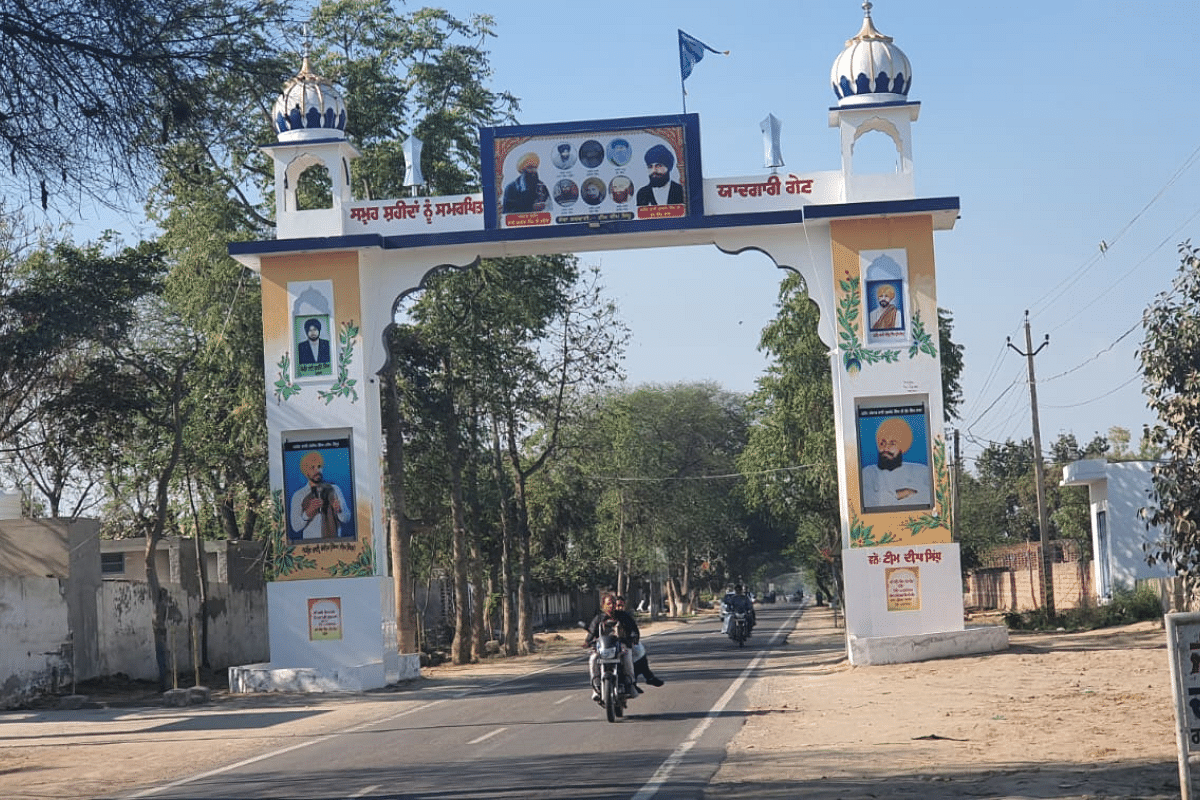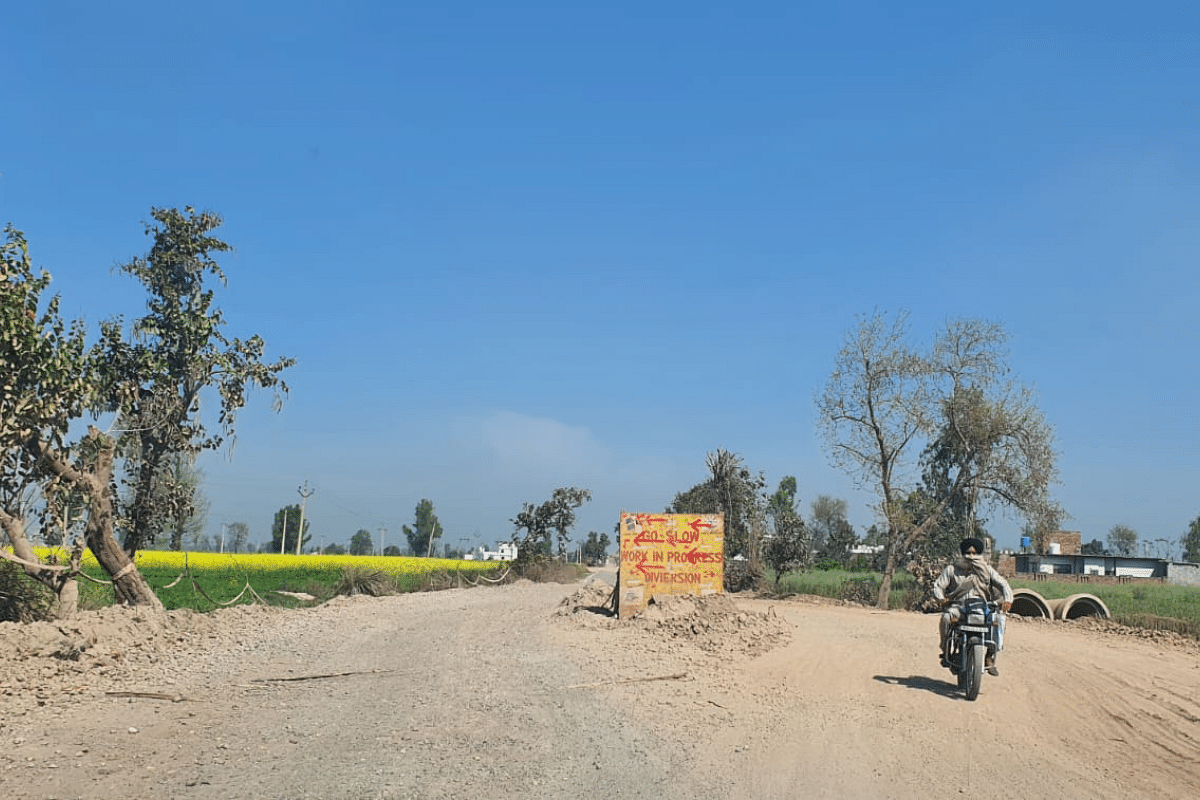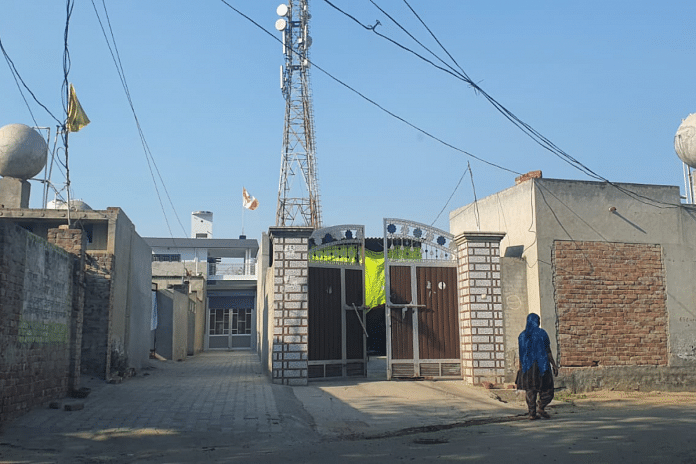Chandigarh: In June 1984, Jarnail Singh Bhindranwale met his end inside the Golden Temple complex after defying the armed forces for four days and four nights. The patriarch of the Khalistan insurgency remains an enigmatic and divisive figure in Punjab, even as the 39th anniversary of Operation Blue Star is just months away.
Enter Amritpal Singh. The youth from Jallupur Khera village left his family’s transport business in Dubai to return home last year. Over six months on, the ‘Waris Punjab De’ head, who put an entire state in turmoil with his radical actions, is now on the run, but not before stoking the fire of Khalistan.
The radical preacher’s legions of followers see Bhindranwale in him, while his detractors scowl at the mere mention of his name. Wanted under the National Security Act (NSA) for activities “prejudicial to the security of India and the maintenance of public order”, Amritpal now is Punjab’s most wanted man.
But do people support Amritpal? Does Punjab want Khalistan? ThePrint team travelled extensively in the Malwa and Majha belts to get a sense of ground sentiments.
‘He’s trying to push Punjab back into the dark days’
Kotli, a small village in Ludhiana district, is the hometown of Beant Singh, the former chief minister who is credited with successfully crushing the Khalistan militancy with a heavy hand. Singh had to pay a heavy price — he was assassinated in 1995.
Among local residents, the general sentiment towards Amritpal is that of mistrust. “There is absolutely no talk of Khalistan. Just saying that people want Khalistan means nothing. People want development, employment and to live in peace. We have already suffered a lot in the name of Khalistan. None in Punjab want those days to come back,” says sarpanch Varinder Singh.
Piara Singh, who has a shop in Payal town, which has been part of Beant Singh’s family constituency for decades, says he does read about Amritpal in newspapers but adds that the absconder no supporters in the area.
“To be honest, we are not even sure who he is and how he has suddenly come to Punjab and has started talking about Khalistan. We often talk amongst ourselves that he has been sent by agencies to spoil the atmosphere in the state,” Piara Singh’s neighbour says.
Kotli’s sarpanch Varinder Singh is more direct in his assessment of Amritpal: “I have no doubt in my mind that he has been propped by some agencies in order to spoil the atmosphere in Punjab and garner votes. It is a dangerous game and nobody should play it.”
It comes as no surprise that Beant Singh’s grandson Ravneet Singh Bittu is the most vocal critic of Amritpal. In February, the Ludhiana MP had claimed he received threats for speaking against the self-styled preacher.
“Amritpal is not a child that does not understand the impact of what is saying and doing. He knows what he is doing and he is trying to push Punjab back into the dark days of militancy for which not only him but thousands of Punjabis will have to pay a price,” Bittu told a news channel a fortnight ago.
Jagjit Singh, owner of a dhaba on the GT Road near Doraha, remembers the trauma of Sikh militancy of the late 1980s and early 1990s.
“We were very young when our parents lived through that period of militancy. It was really bad. We lived in constant fear. Since then so much has changed. We have started businesses. People have jobs and now the same people have stakes in Punjab’s peaceful future; not another era of violence,” he says.
From being a socio-religious activist, Amritpal took more radical steps as he went on to espouse the creation of a separate Khalistan. And just when he was being relegated to the position of “another radical Sikh activist”, Amritpal made his presence felt when he along with thousands of supporters laid siege to the Ajnala police station in February.
While the siege brought the Punjab Police down on its knees that day, the state intelligence was baffled at the number of supporters he had amassed in the past few months.
“People are only supporting Amritpal for as long as he is talking about drug de-addiction and amrit sanchar. It was not right for him to have carried the holy Guru Granth Sahib to the Ajnala police station,” says Gurjeet Singh who served as a paathi (reader of Guru Granth Sahib) in a gurdwara on the GT Road in Libra village.
Also Read: ‘Release all those arrested in Amritpal crackdown in 24 hrs’: Akal Takht’s ultimatum to Punjab govt
In Rode, ‘everybody knows Amritpal’
In Bhindranwale’s ancestral village Rode, reactions of the villagers are starkly opposite when it comes to Amritpal, but the same when it comes to the question of Khalistan.
“Everybody knows Amritpal. He has come from Dubai. He is a young man who wants to do something for Punjab. He wants to take children and youngsters out of the malaise of drugs, so what is wrong in it?” says elderly resident Mukhtiar Singh.
But what about Khalistan? “Nobody is talking about Khalistan. There is no movement like that,” adds Mukhtiar, sitting on the roadside with his neighbours whom he met after remaining several months in Canada with his family.
Five years ago, a gurdwara was built in Bhindranwale’s memory in the village where he was born in 1947. The ‘Santa da Gurdwara’ — the focal point of the village — draws large crowds, prominent politicians and Sikh preachers during the annual ‘Shahidi Samagam’ every June.
Shortly after his arrival from Dubai in August, Amritpal had on 29 September donned the turban in a well-attended ceremony at this gurdwara as a symbolic gesture of taking over ‘Waris Punjab De’.
“He is not trying to be Sant Bhindranwale. In fact that day, he said that he can never be equal to him,” adds Mukhtiar Singh.
What about Amritpal taking the Guru Granth Sahib to Ajnala police station? “What about the Akalis who fired at the Guru Granth Sahib with bullets?” Mukhtiar replies, referring to the 2015 Kotkapura police firing case.
Unrest had spread after a series of sacrilege incidents in 2015, when the Shiromani Akali Dal-BJP were in government. Police had fired on a crowd demanding justice that led to the killing of two persons at Behbal Kalan in Kotkapura sub division of Faridkot district.
Former chief minister Parkash Singh Badal and his son and deputy Sukhbir Badal faced public ire for not bringing the culprits to book. The Akalis were wiped out in the 2017 and 2022 elections.
Amritpal is on a mission to reform youth and it would be a good thing if they could be taken out of addiction and made religious, claims Balwinder Singh, a paathi in the village.
“He talks about amrit sanchar (baptising Sikhs) among the youth which is needed. Once a month on sangrandh (beginning of the traditional month), amrit sanchar is done in the village gurdwara as well,” says Balwinder, who had attended Amritpal’s dastarbandi (turban) ceremony.
Rode sarpanch Harmandeep Singh alias Babbu also supports Amritpal. But there is nothing like a demand for Khalistan, he says. “Not a single person is talking about it.” The sarpanch’s main concern is the sudden increase in crimes in the area. “Everyday, we are coming across multiple people who have been contacted by gangsters for extortion.”
Sita Ram, a Hindu resident, is all praise for the facilities in the village. The school for girls is very good, then there are polytechnics and stadiums, he points out. But when asked about Amritpal and Khalistan, he refuses to say anything.

Barely 10 km away is Budh Singhwala, the village of dreaded militant Gurjant Singh who was killed in 1992. Singh was the founder and leader of the Khalistan Liberation Force. Last month, a team of ‘Waris Punjab De’ led by Amritpal set up a gate on the main road near the village.
Villagers, however, are not impressed. “First of all, the gate should have been set up outside our village, not on the main road. We have great respect for Gurjant Singh, and we would have preferred that only pictures of him and his family, who did the supreme sacrifice for their cause, were placed there,” says a shopkeeper.
Sant Singh, a juice shop owner in neighbouring Channuwala village, says Amritpal had arrived with his supporters for the inauguration and no local youth joined them. “Some people, however, did go there out of curiosity. There is absolutely no talk about Khalistan, and no support for Amritpal here,” he says.
Budh Singh Wala Manpreet Singh, a fan repair shop owner, claims he, too, did not attend the event. “It is best to stay away from such activities,” he said.
In Ferozepur district, businessman businessman Sunny Singh says his family migrated from Rajasthan after the 1984 riots. “We have already suffered so much. Now we are well-established here. Why would we want those days to return?” the car repair shop owner asserts.
Drugs, no jobs pushing youth to ‘desperation’
A majority of Amritpal supporters are also from Majha region, say the police. The three border districts of Amritsar, Tarn Taran and Gurdaspur — which fall in this region — had seen the peak of militancy in the 1980s and 1990s.
People in Majha openly talk about the rampant problem of drug addiction, unemployment, lack of development and opportunities for the youth.
“People are with Amritpal because he is talking about drug de-addiction. Police in the villages know who is selling drugs and their buyers, but they don’t do anything to stop them. Now why should the police feel bad if Amritpal is telling youth not to take drugs?” questions Kartar Singh, a Batala resident.

“Yes there are many problems. Development in this belt is just 30 per cent of what happened in the rest of Punjab. Look at this (Ajnala-Dera Baba Nanak) road. It has been under construction for 2 years now. But the solution does not lie in the creation of Khalistan. That will only create more problems,” says Navneet Singh, an agriculture implement shop owner in Ajnala town in Amritsar district.
The pending construction of the road was a major assembly election issue last year.
“There are two ministers from Ajnala in the Aam Aadmi Party cabinet and yet there is no development. Village youngsters have nothing to do. They roam around on bikes. Why just Amritpal, they will follow anyone who they think can help them go abroad or get a government job,” says Harpal Singh, a tea shop owner at Ramdas township in Amritsar district.
WIth Amritsar being the only big city in Majha region, the opportunities for the youth are limited unlike in Malwa and Doaba.
“Peddling drugs becomes an easy way of earning money. Even women are doing it in villages. Every 2-3 days, we hear of a boy dying of drug overdose. Parents feel that Amritpal will help their sons get out of the addiction. Police action against Amritpal is wrong. So many young boys have been picked up unnecessarily. They are not asking for Khalistan,” says Balbir Singh, a farmer at Awan village in Amritsar district.
Gurdeep Singh, an immigration agent in Amritsar city, agrees that a limited avenue of livelihood is pushing the youths to desperation. “Amritpal has support from unemployed youth, who are either waiting to go abroad or whose visas have not been okayed. This area is next to the international border and there is no development as people want to go out, not invest,” he says.
The immigration agent has sent his two sons to Canada. “Till the government gives 23,000 jobs to youth in border towns and villages, something or the other will keep happening here.”
(Edited by Tony Rai)
Also Read: Deep Sidhu loyalists, musclemen & social media warriors — the men who made Amritpal



